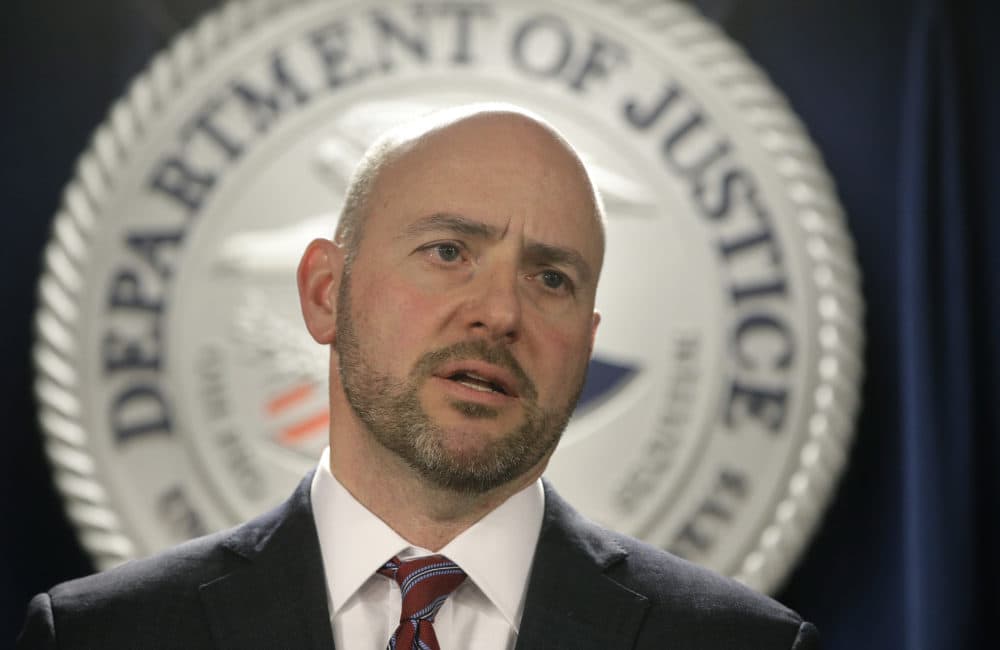Advertisement
20 Guilty Pleas, 30 Pending Cases: Here's Where The College Admissions Scandal Stands

On Monday, attorneys for 29 people accused of some involvement in the college admissions scheme head to federal court for a status update.
All of these accused are fighting the charges, while 20 others have pleaded guilty and are awaiting sentencing. One couple charged in the case has filed a motion to dismiss the indictment altogether.
Here's where the cases stand, three months after a federal judge unsealed the indictments.
2 'side doors' into college
At the heart of the allegations is a college consultant named William "Rick" Singer. He's pleaded guilty and is cooperating with prosecutors. He created what he called a "side door" for prospective students to get into college. One scheme involved cheating on or falsifying the ACT or SAT exams, while the other involved falsely designating prospective students as recruits to college athletics.
In the testing scheme, Singer would arrange for a Harvard alumnus named Mark Riddell to proctor the exams for his clients' children at testing centers in West Hollywood, California, or Houston. Riddell, who has pleaded guilty, would either coach the students while they took the exams or correct their exams after completion.
For college athletes, Singer allegedly paid coaches to create fake athletic profiles for his clients' children and to designate them as recruited athletes for a college team.
Advertisement
Parents have admitted to paying Singer's not-for-profit organization, the Key Worldwide Foundation, as little as $15,000 or as much as $500,000 for Singer's services. One family reportedly paid $6.5 million.
20 people have pleaded guilty so far
The first sentencing in these cases is scheduled for next Wednesday, June 12, starting with the former Stanford sailing coach John Vandemoer. Prosecutors have recommended an 18-month prison sentence.
Among those also facing prison time are Singer and Riddell, former Yale women's head soccer coach Rudolph Meredith, former University of Southern California assistant women's soccer coach Laura Janke and former University of Texas men's tennis head coach Michael Center. Fourteen parents are also facing prison time.
Most of the federal charges in these cases carry a maximum 20 years in prison. For those who have reached plea agreements, prosecutors are recommending much shorter sentences — some for as little as four months. Some defense attorneys are asking for no prison time.
So far, the ultimate how-the-mighty-have-fallen moment came last month in the case of Gordon Caplan. He was co-chair of Willkie Farr & Gallagher, the huge New York law firm founded by Wendell Willkie, the Republican who ran for president against Franklin Roosevelt in 1940. Caplan pleaded guilty in May to bribing test administrators to change his daughter's ACT scores. He was one of the few parents to speak outside court, saying he was deeply ashamed.
"But I'm also sorry to all the other kids who are in the admissions process, and to all the parents that are helping them and supporting them," he said. "I'm truly sorry."
It was a stark contrast with the man who, according to the indictment, said in a wiretapped phone conversation, "I'm not worried about the moral issue here."
30 cases still pending
There are 30 people who have pleaded not guilty. They include 19 parents, seven former coaches or athletic leaders, two former employees of Singer's organizations and two test center administrators.
It'll be up to prosecutors to prove the cases. On Monday, attorneys for 29 of them will be in federal court for status hearings. All the parents are facing conspiracy charges.
One of the most interesting defense arguments comes from two Palo Alto, California parents, Dr. Gregory Colburn and his wife, Amy. They argue the parents were not engaged in a conspiracy, citing a Supreme Court decision written by the late Antonin Scalia which states that for a conspiracy to exist, the people on the rim of the conspiracy — that is the parents in this case — would have had to know one another. The Colburns' argument is that because most of the parents did not know the other parents, there was no conspiracy and, therefore, no crime. They're asking the judge in their case to throw it out of court.
Assistant U.S. Attorney Eric Rosen told one of the judges last month that he does not expect any of these cases will go to trial because he expects to reach plea agreements with all the defendants.
Are more indictments likely?
U.S. Attorney Andrew Lelling has said his prosecutors are still investigating, and he has not ruled out charging students as well as parents.
The two main people in the conspiracy — Singer and Riddell — as well as one of the coaches are cooperating with prosecutors, which makes it possible more indictments could come.
This segment aired on June 3, 2019.
